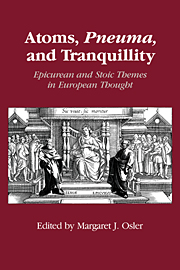Book contents
- Frontmatter
- Contents
- List of contributors
- Acknowledgments
- Introduction
- 1 Ethics and logic in Stoicism
- 2 Medieval connectives, Hellenistic connections: the strange case of propositional logic
- 3 Stoic psychotherapy in the Middle Ages and Renaissance: Petrarch's De remediis
- 4 Alonso de Cartagena and John Calvin as interpreters of Seneca's De clementia
- 5 The Epicurean in Lorenzo Valla's On Pleasure
- 6 Seneca's role in popularizing Epicurus in the sixteenth century
- 7 Stoic contributions to early modern science
- 8 Fortune, fate, and divination: Gassendi's voluntarist theology and the baptism of Epicureanism
- 9 Epicureanism and the creation of a privatist ethic in early seventeenth-century France
- 10 Robert Boyle on Epicurean atheism and atomism
- 11 Stoic and Epicurean doctrines in Newton's system of the world
- 12 Locke, Willis, and the seventeenth-century Epicurean soul
- 13 The Epicurean new way of ideas: Gassendi, Locke, and Berkeley
- 14 The Stoic legacy in the early Scottish Enlightenment
- Index
9 - Epicureanism and the creation of a privatist ethic in early seventeenth-century France
Published online by Cambridge University Press: 13 November 2009
- Frontmatter
- Contents
- List of contributors
- Acknowledgments
- Introduction
- 1 Ethics and logic in Stoicism
- 2 Medieval connectives, Hellenistic connections: the strange case of propositional logic
- 3 Stoic psychotherapy in the Middle Ages and Renaissance: Petrarch's De remediis
- 4 Alonso de Cartagena and John Calvin as interpreters of Seneca's De clementia
- 5 The Epicurean in Lorenzo Valla's On Pleasure
- 6 Seneca's role in popularizing Epicurus in the sixteenth century
- 7 Stoic contributions to early modern science
- 8 Fortune, fate, and divination: Gassendi's voluntarist theology and the baptism of Epicureanism
- 9 Epicureanism and the creation of a privatist ethic in early seventeenth-century France
- 10 Robert Boyle on Epicurean atheism and atomism
- 11 Stoic and Epicurean doctrines in Newton's system of the world
- 12 Locke, Willis, and the seventeenth-century Epicurean soul
- 13 The Epicurean new way of ideas: Gassendi, Locke, and Berkeley
- 14 The Stoic legacy in the early Scottish Enlightenment
- Index
Summary
By the seventeenth century in France, as Nannerl Keohane eloquently argues, the ideal of civic responsibility and commitment characteristic of the later Renaissance was being replaced by an advocacy of the private life. This trend was particularly strong among the libertines, the French freethinkers who challenged traditional intellectual authorities, who “took seriously the Epicurean counsel to avoid the business of the world. They conformed to its demands as far as necessary, and found their true pleasure in the company of friends.”
The most prominent Epicurean in France, Pierre Gassendi, joined his libertine friends in believing that philosophy could flourish only if it were free from the restraints of both the world and authority. To Gassendi, living a retired life freed the wise man from the time-consuming demands of the public life and at the same time allowed him to philosophize freely, obligated to no one but himself. In 1637, Gassendi wrote a remarkable letter to Galileo, telling the Italian to regard his house arrest as a “most desired and fortunate retirement” and that “wise men desire nothing more than to be removed from the turbulence of the court and the tumults of the city, and … from the profane crowd, which like a many-headed beast knows nothing human, and hopes for nothing but lying, invidiousness, perfidy, and other such things.”
As early as his first published work, an anti-Aristotelian tract entitled the Exercitationes paradoxicae adversus Aristoteleos (Grenoble, 1624), Gassendi had indicated that the moral teachings of Epicurus held a special fascination for him, particularly the Epicurean principle that pleasure, or the tranquillity of the soul, is the highest good.
- Type
- Chapter
- Information
- Atoms, Pneuma, and TranquillityEpicurean and Stoic Themes in European Thought, pp. 175 - 196Publisher: Cambridge University PressPrint publication year: 1991
- 1
- Cited by



